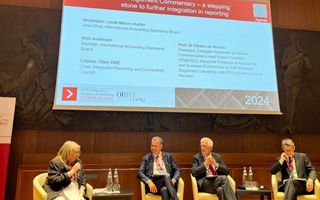(Finance) – “Integrated Thinking and Reporting: increasing quality, strengthening value”, is the title of the international conference held today in Milan, organized by the IFRS Foundation in collaboration with the Italian Business Reporting Organization (OIBR). At the center of the work is a comparison among over 40 speakers on the enduring value of integrated reporting practices and how this facilitates the adoption of international principles on sustainability reporting, the International Sustainability Disclosure Standards and provides input for broader technical developments, setting the right conditions for further integration into reporting in the future.
The Integrated Reporting Framework it has been used by businesses around the world for over a decade, driving holistic thinking and reporting on how a business creates value in the short, medium and long term. The IFRS 2024 conference in Milan focused on ways to increase the quality and strengthen the value of integrated thinking and reporting, aiming to demonstrate how IFRS S1 and IFRS S2 they provide high quality content to improve integrated reports. During the work, the ways in which the Management Commentary project it is developing on the concepts of the Integrated Reporting Framework. Also presented are practical tools capable of providing a useful contribution to improving the quality and relevance of the information.
The president of the National Council of Accountants Elbano de Nuccio, among the speakers at the conference, he recalled how “accountants have always been attentive to the evolution of corporate information and communication on ESG issues, convinced that these factors have a substantial impact on the ability of companies to produce and preserve value. From this perspective, the integration between information of a financial nature and information dThe non-financial nature appears to be a pathalready outlined by the IR Framework and today more relevant than ever, which is compatible with the knowledge needs of capital providers and which companies, even small ones, must maintain in order to continue to be competitive in the short term And in the medium-long term”.
Alessandro Lai, President of OIBR (Foundation of which the National Council of Accountants is a founding member) underlined how “the conference saw the participation of the top management of the IFRS foundation and the ISSB, with over 300 registered in attendance and 2000 remotely. The conference aimed to verify the interrelationship between the new sustainability standards promoted by the ISSB and integrated reporting. We are happy that the debate at such a high level has produced important stimuli for operators, for standard setters and for accounting professions, for which the considerations made by prof. Elbano de Nuccio on the Management Commentary have opened a lot of discussion participatory and full of implications”.
For the general secretary of OIBR Stefano Zambon “Having the entire leadership of the IFRS Foundation and a large participation in the Milan Conference was an important demonstration that Italy can play a leading role internationally in the world of reporting. The OIBR Foundation together with the National Council of accountants and their stakeholders is pleased to have co-organised this significant event with the IFRS Foundation”.
The IFRS Foundation is an international organisation non-profit organization in the public interest established to develop high-quality, understandable, applicable and globally accepted sustainability accounting and disclosure standards. Its standards are developed by its two standard-setting bodies, the International Accounting Standards Board (IASB) and the International Sustainability Standards Board (ISSB).
The Italian Business Reporting Organism – Sustainability, Non-Financial and Integrated Reporting (OIBR) is the body dedicated in Italy to issues related to the reporting and disclosure of information and measures (KPIs) related to sustainability/ESG/climate change, non-financial declaration (NFS) , intangibles and intellectual capital, and integrated reporting and governance (‘integrated thinking’).
